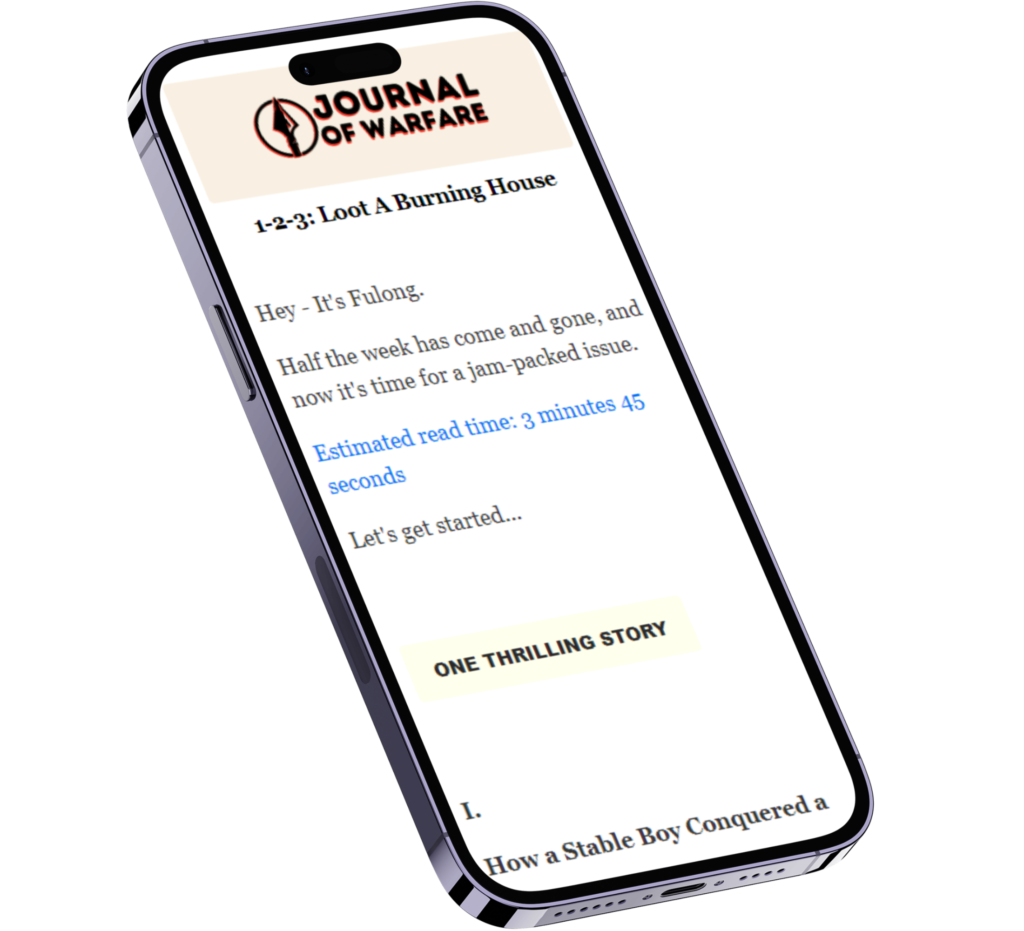Hey – It’s Fulong.
Half the week has come and gone, and now it’s time for a jam-packed issue.
Estimated read time: 3 minutes 45 seconds
Let’s get started…
One Thrilling Story
I.
How a Stable Boy Conquered a Kingdom
In the year 499 B.C., during the Spring and Autumn Period of Ancient China, the king of Wu conquered the state of Yue and captured its king, Guo Jian. But rather than having him executed, the king of Wu decided to humiliate him by having him work as a stable boy in charge of cleaning the imperial stables.
After three years, when the king of Wu was feeling suitably invincible, he decided to release Guo Jian and sent him back to his country to have him work as a vassal of the state of Wu.
Once back in his home country, Guo Jian set about rebuilding his economy and reputation. By ruling benevolently, the people prospered, and upstanding counselors and commanders were drawn to his court to offer their services.
After seven years of his enlightened rule had passed, Guo Jian knew that his people were now willing to undergo the hardships of war for his cause.
To prepare for his impending attack on Wu, he began by employing The Strategy of Sowing Discord. First, he bribed Wu’s chief minister with beautiful women and thousands of pieces of gold.
Next, he planted false evidence against Wu’s chief councilor which caused him to commit suicide.
Then fate provided Guo Jian with the opportunity to employ another strategy.
That year Wu was experiencing a severe drought and the people were hungry. The king of Wu had spent copiously from his treasury to build a new palace and was reluctant to provide relief.
Seizing the opportunity, Guo Jian sent a tribute consisting of a huge shipment of building materials with a full honor guard in parade dress. This ostentatious display of wealth slowly wound its way through the hardest-hit areas of the drought.
The impoverished peasantry, seeing that their king was spending the treasury on lumber for his palace instead of rice for his subjects, began to revolt.
The fatally arrogant king of Wu still balked at the earnest advice to send provisions to the drought-ridden provinces, and sent out the army instead.
This left the Wu capital poorly defended. As soon as his spies reported on this, Guo Jian launched an attack on the capital of Wu. The king of Wu woke the next day to find his city surrounded and his army far away on campaign.
Left with no able commanders and only the advice of the few ineffectual courtiers that survived his purges, the king fled into the countryside where he was dealt with later.
Two Warfare Tips
I.
Loot A Burning House
When a country is beset by internal conflicts, when disease and famine ravage the population, when corruption and crime are rampant, then it will be unable to deal with an outside threat. When these factors are present, then that is the time to attack.
Guo Jian understood this very well. When Wu was strong, he bided his time. Slowly, he waited for Wu to become sick and frail, and even helped exacerbate its sickness.
And, when the time was ripe, he attacked and conquered Wu. Thus Guo Jian looted the burning house of Wu by setting the spark.
II.
Patience is Key
Guo Jian’s wisdom is manifold. Another lesson that can be derived from his story is the value of patience. Instead of rashly attacking when Wu was strong and stable, he patiently waited.
He gradually strengthened his position, and he gradually weakened his enemy before he landed the final devastating blow.
You would do well to learn from his wisdom.
Three Favourite Quotes
I.
An ancient Chinese proverb on attacking the weak:
“When a tiger is sick or wounded, jackals gather nearby.”
II.
Sun Tzu on an exhausted army:
“Now, when your army is exhausted and your resources are spent, this is the time that new opponents enter the field to take advantage of your weakness. No matter how clever the leader is, once this situation has come about, the end is inevitable.”
III.
Leo Tolstoy on the value of patience:
“The two most powerful warriors are patience and time.”
See you sooner or later — Fulong


